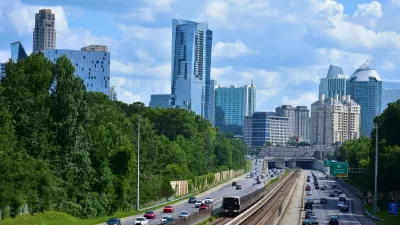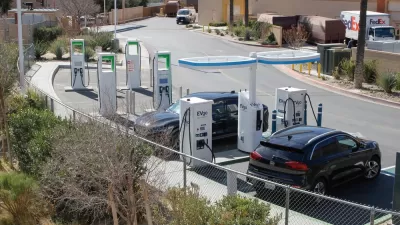As the Highway Trust Fund goes bankrupt, the editors of Bloomberg suggest new ways to finance transportation infrastructure that integrates new technology, increasing public-private associations and loosening the funding framework itself.
The central weakness exposed by the conflicting proposals from the White House, the Senate, and the House to finance transportation infrastructure is identified by the Editors as each plan's reliance on unsustainable short-term funding sources. This weakness is, of course, caused by the imminent demise of the Highway Trust Fund.
According to the editors, "The reason everyone is resorting to such sophistry is that the Highway Trust Fund, which gets the bulk of its revenue from a federal excise tax on gasoline of 18.4 cents per gallon, is nearly bankrupt. Because the tax isn't adjusted for inflation, and has been pegged at the same rate since 1993, it has covered less and less of U.S. transportation spending."
As a response to the politically untenable proposition of raising the gas tax, the editors propose new funding approaches to take the place of the Highway Trust Fund. "One promising future replacement for the gas tax is a 'vehicle miles-traveled fee,' which would use satellite tracking or a variety of other methods to charge drivers by mileage, regardless of the fuel they use."
Another avenue identified is, "more and better public-private partnerships for construction projects," based on the success of the much lauded Transportation Infrastructure Finance and Innovation Act (or TIFIA).
Lastly, the editors suggest that the structure of transportation funding could use an update to reduce bureaucracy and allow states more control over federal funding use.
FULL STORY: With Gas Tax on Empty U.S. Must Find New Way to Fund Roads

Alabama: Trump Terminates Settlements for Black Communities Harmed By Raw Sewage
Trump deemed the landmark civil rights agreement “illegal DEI and environmental justice policy.”

Planetizen Federal Action Tracker
A weekly monitor of how Trump’s orders and actions are impacting planners and planning in America.

The 120 Year Old Tiny Home Villages That Sheltered San Francisco’s Earthquake Refugees
More than a century ago, San Francisco mobilized to house thousands of residents displaced by the 1906 earthquake. Could their strategy offer a model for the present?

In Both Crashes and Crime, Public Transportation is Far Safer than Driving
Contrary to popular assumptions, public transportation has far lower crash and crime rates than automobile travel. For safer communities, improve and encourage transit travel.

Report: Zoning Reforms Should Complement Nashville’s Ambitious Transit Plan
Without reform, restrictive zoning codes will limit the impact of the city’s planned transit expansion and could exclude some of the residents who depend on transit the most.

Judge Orders Release of Frozen IRA, IIJA Funding
The decision is a victory for environmental groups who charged that freezing funds for critical infrastructure and disaster response programs caused “real and irreparable harm” to communities.
Urban Design for Planners 1: Software Tools
This six-course series explores essential urban design concepts using open source software and equips planners with the tools they need to participate fully in the urban design process.
Planning for Universal Design
Learn the tools for implementing Universal Design in planning regulations.
Clanton & Associates, Inc.
Jessamine County Fiscal Court
Institute for Housing and Urban Development Studies (IHS)
City of Grandview
Harvard GSD Executive Education
Toledo-Lucas County Plan Commissions
Salt Lake City
NYU Wagner Graduate School of Public Service





























